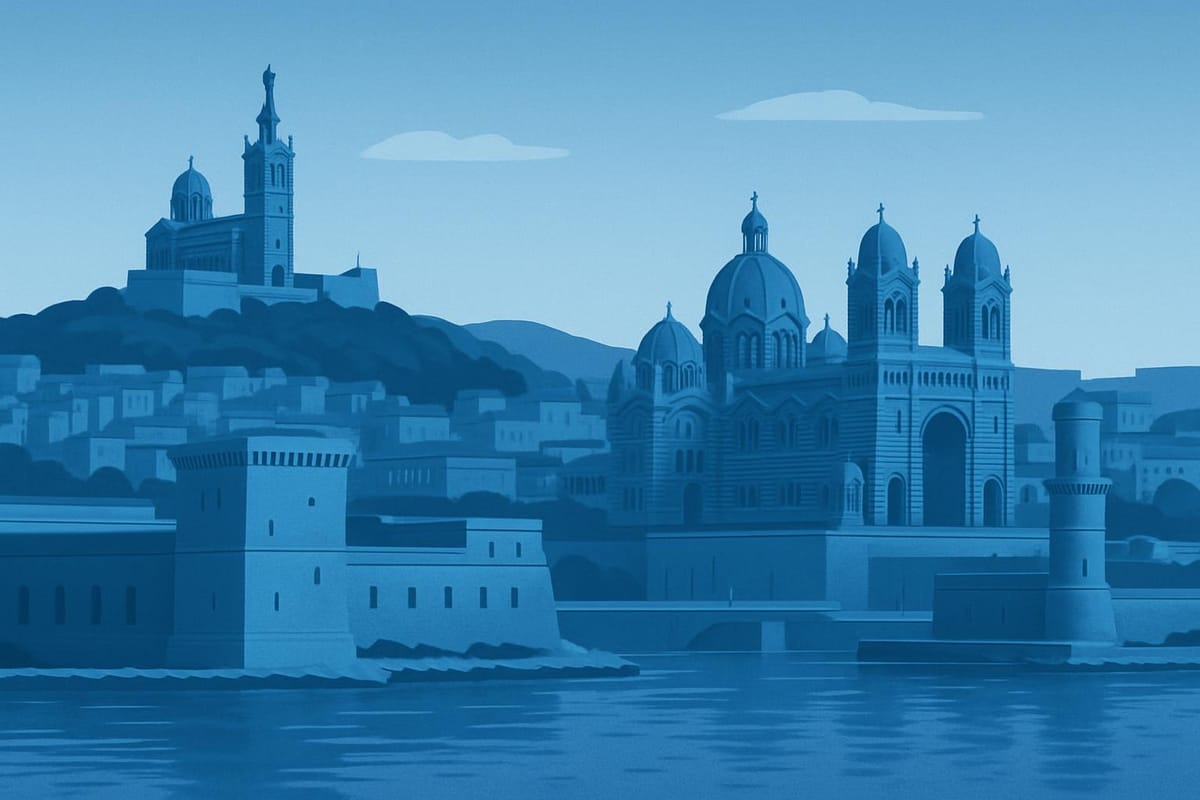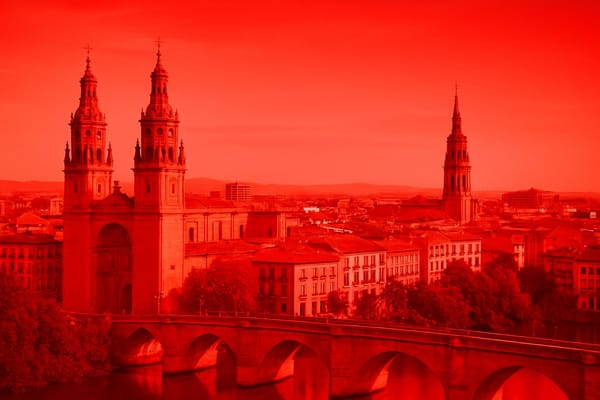Marseille
Explore stunning calanques, vibrant Old Port, seafood, boat tours & sunlit Mediterranean beaches

Important things to know about Marseille
Marseille, France unfolds as a living, breathing port city on the edge of the Mediterranean, where salt air mixes with the aroma of street food and the hum of daily commerce; its identity is shaped by a long history of trade and migration, reflected in a multicultural population that brings together languages, traditions and bold culinary influences - from simple fish stews to inventive urban food scenes that emphasize fresh, local ingredients. The urban fabric of Marseille balances authenticity and modernity, with neighborhoods that pulse with markets, artisans, and community life while new developments and creative industries inject energy into the local economy, making the city a hub for shipping, technology, and cultural production in southern France. Streets echo with diverse rhythms and languages, public spaces host lively conversations, and the rhythm of daily life is attuned to a Mediterranean climate that favors outdoor cafés, late dinners, and long evenings. Architecture here is a layered narrative of eras, social change and adaptation, producing a skyline and streetscapes that are at once rugged and charismatic; this urban diversity fosters a strong sense of local pride and resilience, as residents navigate contemporary challenges and opportunities with entrepreneurial spirit. Whether described through its culinary traditions, vibrant music and arts scenes, dynamic neighborhoods, or strategic economic role, Marseille stands out as a city of contrasts and cohesion - an unmistakable coastal metropolis where sea, culture and commerce continually redefine what it means to live and thrive on the shores of the Mediterranean.
Sightseeing hot-spots in Marseille
Marseille is a dynamic Mediterranean port where centuries of trade and culture meet modern life, and the best of Marseille sightseeing begins at the lively Vieux-Port. Strolling along the quays offers sweeping sea views, street performers and the daily fish market that feeds the city’s famous bouillabaisse. From here you can catch ferries to the Frioul Islands or take a boat tour to admire the coastline; the harbor itself is the historic heart of Marseille, France, and a perfect starting point for discovering the city’s layered history and vibrant culinary scene.
Climb up to Notre-Dame de la Garde for panoramic vistas that span the Old Port, the rooftops of Le Panier, and the glittering blue of the Mediterranean-this hilltop basilica is a must for any Marseille itinerary. Nearby, the narrow streets of Le Panier reveal colorful facades, artisan shops and contemporary street art, while the striking MuCEM (Museum of Civilizations of Europe and the Mediterranean) blends cutting-edge architecture with exhibitions that illuminate the region’s cultural connections. These central attractions are ideal for travelers seeking both historic charm and modern museums when planning things to do in Marseille.
For nature lovers, the dramatic limestone cliffs and turquoise inlets of the Calanques offer unforgettable day trips and hiking trails that contrast with the city’s urban energy. Whether you choose a boat excursion to secluded coves, a coastal hike for dramatic overlooks, or a beachside picnic, the Calanques are one of the most compelling Marseille attractions. Combine seaside exploration with markets, Provençal flavors and lively neighborhoods to create a balanced Marseille sightseeing experience that captures the essence of southern France and the variety of activities this coastal metropolis has to offer.
Hotels to enjoy in Marseille
Marseille is a vibrant coastal city where hotels in Marseille, France range from chic boutique stays in the narrow streets of Le Panier to grand seafront properties along La Corniche. Travelers searching for Marseille hotels can find options that cater to every taste and budget, from luxury addresses with rooftop terraces and spas to friendly budget accommodations close to the Vieux-Port. Many hotels emphasize panoramic sea views, authentic Provençal design, and easy access to cultural highlights such as the MuCEM and Notre-Dame de la Garde. Business travelers appreciate modern conference facilities and proximity to Marseille Saint-Charles station, while families look for spacious rooms, concierge services, and local experiences that bring Provençal cuisine and markets to life. With a range of stay types - from historic mansions converted into intimate inns to sleek contemporary chains - hotels in Marseille blend Mediterranean charm with practical conveniences like free Wi-Fi, airport shuttles, and bike rentals.
Choosing the right Marseille hotel can transform your trip into an unforgettable coastal escape; prioritize location if you want to stroll from your door to seafood restaurants at the Old Port, or pick a quieter neighborhood for peaceful evenings after day trips to the Calanques. Many Marseille hotels now highlight sustainable practices and locally sourced breakfasts, appealing to eco-conscious visitors. Whether you book a seafront suite to watch sunrise over the Mediterranean or a centrally located room to explore museums and markets on foot, accommodations in Marseille offer a mix of history, modern comfort, and Provençal flavor that makes staying in Marseille, France both convenient and inspiring.
Restaurants to try in Marseille
Marseille restaurants capture the energy of the city with a mix of historic brasseries, modern bistros and seafood specialists lining the Vieux-Port. Dining here means tasting authentic bouillabaisse, fresh fish grilled over open flame and small plates that celebrate Provençal herbs and olive oil. From cozy, family-run eateries tucked into narrow streets to Michelin-starred kitchens reinventing coastal traditions, the food scene offers something for every palate. Travelers searching for the best restaurants Marseille has to offer will find lively terraces where the aroma of garlic and saffron mingles with sea breeze, an open invitation to explore French Mediterranean flavors and local markets that supply the day’s catch.
When planning where to eat, remember that peak hours and special menus often reflect Marseille’s rhythm, with long lunches and late dinners that pair well with regional wines and local produce. Savory starters like panisse and aioli share the menu with inventive tasting menus that showcase seasonal ingredients sourced from nearby markets. Whether you’re writing a guide to restaurants in Marseille or simply seeking an unforgettable meal, the city rewards curiosity-each neighborhood reveals its own culinary personality, from street-food corners to refined waterfront dining at sunset, promising memorable flavors rooted in tradition and modern creativity.
Best shopping stops in Marseille
Marseille shopping is a vibrant mix of historic charm and contemporary style that any visitor will remember. Strolling from the Vieux-Port toward the narrow alleys of Le Panier, you’ll find independent boutiques, galleries and ateliers where local artisans craft jewelry, ceramics and textiles with a Provençal flair. The city’s main retail artery, Rue Saint-Ferréol, offers international brands and department stores for everyday finds, while the waterfront complex Les Terrasses du Port brings together designer labels, concept stores and panoramic views over the sea. For fashion-forward shoppers and vintage hunters, the bohemian quarter of Cours Julien pulses with street art, creative shops and concept stores that capture Marseille’s edgy cultural mix.
For a taste of true Marseille shopping culture, the colorful food markets and specialty shops are essential. At the Noailles market and the stalls spilling from the alleys near the port you can sample and buy olive oil, Provençal herbs, spices and the iconic Savon de Marseille-perfect souvenirs that evoke the Mediterranean. Flea markets and brocantes appear regularly, rewarding treasure seekers with antique ceramics and retro finds. Whether you’re after luxury labels, artisanal soaps, regional gastronomy or unique home décor, shopping in Marseille combines picturesque settings with authentic local flavors, making it a destination where every purchase tells a story of the city’s heritage and modern creativity.
Nightlife highlights in Marseille
Marseille offers an electric blend of old port charm and contemporary energy after dark: from the glittering promenades around Vieux-Port to the bohemian lanes of Cours Julien, the nightlife in Marseille caters to every mood. You can wander along seafront terraces sipping creative cocktails while watching boats bob under the city lights, then drift toward intimate bars serving local rosé and Provençal-inspired small plates. Those seeking live entertainment will find an eclectic mix of live music venues and underground DJ sets where genres cross freely, and theater or spoken-word nights add cultural depth to the late hours. The contrast between historic waterfront scenes and arty neighborhoods creates memorable evenings that feel both authentically Mediterranean and refreshingly modern.
For a full night out, mix late-night dining with rooftop views and spontaneous street-side aperitifs in neighborhoods like Le Panier or La Plaine; you’ll discover hidden courtyards and friendly locals who steer you to the best spots. Dance floors in the city center pulse until dawn, while more relaxed venues invite conversation and craft cocktails made with regional flavors. Whether you’re after buzzing bars, chilled lounges, or vibrant clubs, Marseille’s after-dark scene delivers variety and vitality, making it a top destination for travelers seeking dynamic and unforgettable nights in France.
Getting around in Marseille
Marseille offers convenient air and rail options for travelers: Marseille Provence Airport handles a mix of international and domestic flights and is served by a regular airport shuttle that links the terminal to the city center and the main rail hub, Marseille Saint-Charles, with a journey time of around 25–30 minutes depending on traffic; from Saint-Charles, passengers can access high-speed TGV services to Paris, Lyon and other major French cities as well as frequent TER regional trains connecting Provence, the Côte d’Azur and Occitanie, making rail travel practical for both short hops and long-distance itineraries; within the city, the station is integrated into Marseille’s public transport network, including metro and tram connections that ease transfers to neighborhoods, ports and tourist sites, while ample taxi and rideshare options complement scheduled services; for visitors and locals alike, the combination of a well-connected airport, reliable shuttle links and a busy, centrally located railway station creates easy transfers and flexible travel choices that support tourism, business trips and regional commuting.
Culture must-see's in Marseille
Marseille, France pulses with a unique blend of Mediterranean fervor and millennia of history, making its cultural highlights irresistible for travelers and locals alike. The Vieux-Port remains the beating heart of the city, where fishermen’s stalls, cafes and sunsets create an authentic backdrop to daily life. Wandering up from the harbor leads to Le Panier, a labyrinth of narrow streets, colorful facades and artisan workshops that reveal Marseille’s layered past. The city’s museum scene - notably the striking MuCEM - explores maritime heritage and contemporary Mediterranean identity, while the hilltop basilica of Notre-Dame de la Garde offers panoramic views and a sense of spiritual continuity. This multicultural port city showcases influences from North Africa, Italy and Provence, visible in its architecture, religious buildings and lively neighborhood markets where tradition and modernity meet.
Beyond monuments, the cultural fabric of Marseille is woven through food, festivals and everyday creativity. The aromatic pull of bouillabaisse and Provençal cuisine invites visitors into convivial dining rituals, while street art and contemporary galleries animate former industrial quarters, reflecting a vibrant urban renaissance. Annual music and film festivals, open-air performances and neighborhood fêtes celebrate both local roots and global connections, and artisan markets offer ceramics, textiles and local olive oil as tactile souvenirs. Whether exploring maritime museums, catching a concert at sunset, or simply sipping pastis on a terrace, experiencing the cultural highlights of Marseille transforms a visit into an immersion in a port city where history, diversity and Mediterranean light converge.
History of Marseille
Marseille’s story begins on the rocky shores of the Mediterranean where Greek sailors from Phocaea founded the trading colony of Massalia around 600 BC, planting the seeds of what would become France’s oldest city. Over centuries, the port’s strategic location turned it into a thriving hub of commerce and culture: Romans integrated the region into their empire, medieval merchants expanded maritime routes, and successive waves of sailors and traders made the city a crossroads between Europe, North Africa, and the Levant. The Vieux-Port has long been the beating heart of urban life, witnessing the rise of fortifications like Fort Saint-Jean and the famed prison fortress Château d'If, immortalized by Alexandre Dumas. The influence of Provence and maritime trade shaped local architecture, language, and cuisine - notably the legendary bouillabaisse - while neighborhoods such as Le Panier preserved narrow streets and traces of ancient urban patterns. Industrialization in the 19th century and the opening of the Suez Canal further amplified Marseille’s role as a major European gateway to the Mediterranean and beyond.
The modern history of Marseille reflects resilience and reinvention, marked by waves of immigration that forged a multicultural identity drawing from Italian, Armenian, North African, and other communities. The city endured occupation and hardship during World War II, followed by extensive postwar reconstruction and urban renewal that reshaped its waterfront and infrastructure. In recent decades Marseille has embraced cultural renewal and tourism, earning recognition as European Capital of Culture 2013 and investing in projects to revitalize the Old Port, the Massif des Calanques, and contemporary museums while preserving historic landmarks like Notre-Dame de la Garde. Today Marseille remains an essential French port and a dynamic city where ancient harbor traditions meet modern shipping, container terminals, and vibrant cultural life. Its layered past - from Massalia to metropolitan France - continues to attract visitors and scholars interested in the rich tapestry of Mediterranean history, maritime trade, and urban diversity that define Marseille’s enduring character.



